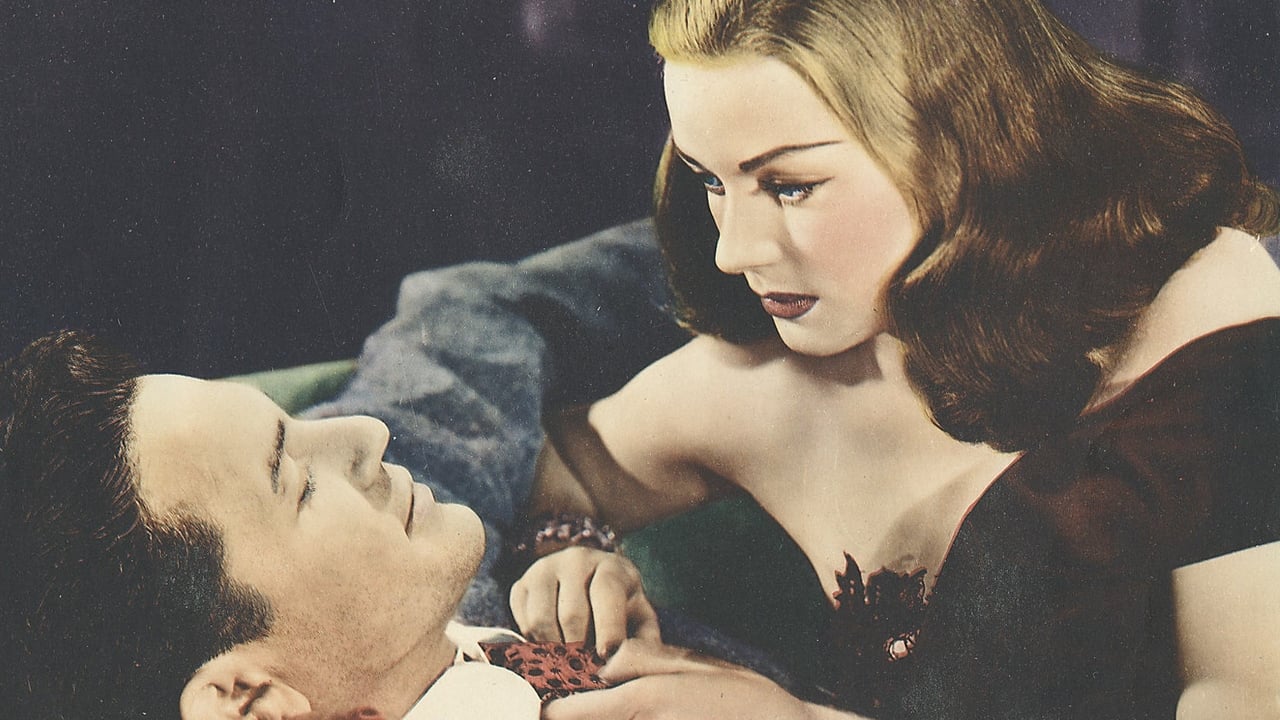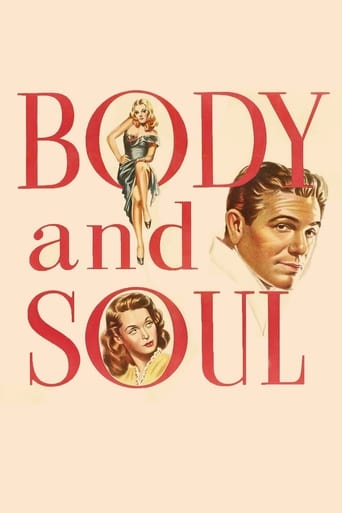

Charley Davis, a young working-class Jewish New Yorker, takes up a career in boxing, a sport for which he proves to have a talent. After a series of victories he rises steadily through the ranks and is eventually rewarded with a shot at the championship. He wins, but success, and the wealth that comes with it, lead to deterioration in his character. He becomes estranged from his mother and his girlfriend Peg, finds himself a mistress, and becomes involved with a shady promoter named Roberts, who has links with the underworld. Roberts arranges for Charley to defend his title against a challenger named Jack Marlowe, but then orders him to throw the fight; the promising but less experienced Marlowe is the underdog so Roberts and his cronies stand to make a lot of money by betting on him. "Body and Soul" has a lot in common with "Champion", another boxing film from the late forties, which tells a broadly similar story. That film too dealt with the rise of a boxing champion who goes off the rails, becomes alienated from his loved ones and allows himself to be drawn into the web of gambling-inspired corruption which afflicted the sport at this period. In both films the hero sees his final fight as a chance to regain his lost self-respect. "Champion" was made two years later, so it was no doubt heavily indebted to the earlier movie. Of the two films I would prefer "Champion"; John Garfield certainly gives a good performance here as Charley, but Kirk Douglas gives a truly great one, one of the best of his career, in the later film. The ending of "Champion" also has a tragic power greater than the more optimistic conclusion of "Body and Soul". Some of the minor characters here are less good; I felt that the German-born British actress Lilli Palmer was miscast as Peg, who is supposed to be an all-American girl-next-door type, and the rather contrived explanation of her accent by reference to a European education was not convincing. ("Devotion", a biopic of the Bronte sisters from around this period, used a similar device to explain why Charlotte's British husband Arthur Nicholls was speaking with a heavy German accent). Nevertheless, there are some interesting things about this movie. There is a genuinely tragic character in Ben Chaplin, Charley's predecessor as champion and later his friend, who is forced by Roberts to fight when medically unfit to do so, and suffers the consequences. Chaplin is played by the black actor Canada Lee, and this was a surprisingly major role for a black character at a time when Hollywood operated an unofficial colour bar and black actors were generally confined to minor roles. The dramatic fight sequences, especially during Charley's final bout with Marlowe, are well done; they are said to have influenced the fight scenes in Martin Scorsese's "Raging Bull". Like a number of other boxing pictures, including "Champion" and "Raging Bull", "Body and Soul" is about more than the sport itself. It is also a parable about the power of money and success to corrupt and a human story about a man's struggle to retain his integrity in the face of temptation. As such it works very well- taut, fast-paced and well put together. 7/10
... View MoreLike the man said if you're gonna steal steal from the best and Abraham Polonsky surely took this to heart when he lifted Golden Boy right out of Cliff Odets' typewriter and added just enough spin to get away with it. What is all the more remarkable are the blatant 'clues'. Garfield, a fellow alumnus with Odets of the Group Theatre actually had a minor role in the original production of Golden Boy - a plot, lest we forget, involving a gifted violinist who takes up prizefighting - more than this Garfield's previous movie role was Humoresque in which he played - yeah, you got it - a gifted violinist corrupted by money. Unlike Joe Bonaparte, Garfield's Charlie Davis is not in conflict with his artistic gifts (he has none) but is hooked on money and all it can buy or, if you want to get fancy, he is fighting his better nature as well as his opponents in the ring. Just because it owes so much to Odets doesn't make it a bad movie but Odets is there in every frame because Polonsky has opted to write about a world familiar to Odets and employs sub-Odets dialogue. In a strong supporting cast, Lloyd Gough, William Conrad, Lilli Palmer, Joseph Pevney and the great Ann Revere only lightweight Hazel Scott is superfluous. By now, of course, Garfield could play characters like this in his sleep but nevertheless this is a fine example of late forties film-making.
... View MoreA boxer fights his way to the top while dealing with corruption. Garfield has perhaps the best role of his career, as he marvelously conveys the toughness, confidence, and compassion of his character. Palmer is equally good as his girlfriend, a practical woman who stands by her man. Revere made a career out of playing understanding mothers, and here she is Garfield's mother. In a sad coincidence, Lee, who plays a rival boxer, had an untimely death of a heart attack in May 1952, two weeks before Garfield died young of a heart attack. Rossen does a good job of creating a gritty, film noir atmosphere in what is generally regarded as one of the best boxing films.
... View MoreThis boxing picture deals with the seedier side of the business; (is there any other?). It helps that it was written by Abraham Polonsky whose script is suitably cynical and hard-boiled. John Garfield is the pugnacious fighter easily swayed by the prospects of easy money and not adverse to taking a dive. It's a fine, hard-nosed performance. Garfield was always at his best in roles that required him to battle with his conscience.The whole movie is well cast. The under-rated Lilli Palmer is fine as the 'nice' girl who loves him as is Hazel Brooks as the 'bad' girl who seduces him while the villains are ably taken care of by Lloyd Gough and William Conrad. Best of all there is Anne Revere as Garfield's mother. (Did Revere play everybody's mother movies?). It's another of her no-nonsense roles. Revere was one tough cookie who kept her heart of gold well-hidden. The climatic fight scene is very well staged and Robert Parrish and Frances Lyon's editing won the Oscar while James Wong Howe's cinematography adds considerably to the realism.
... View More